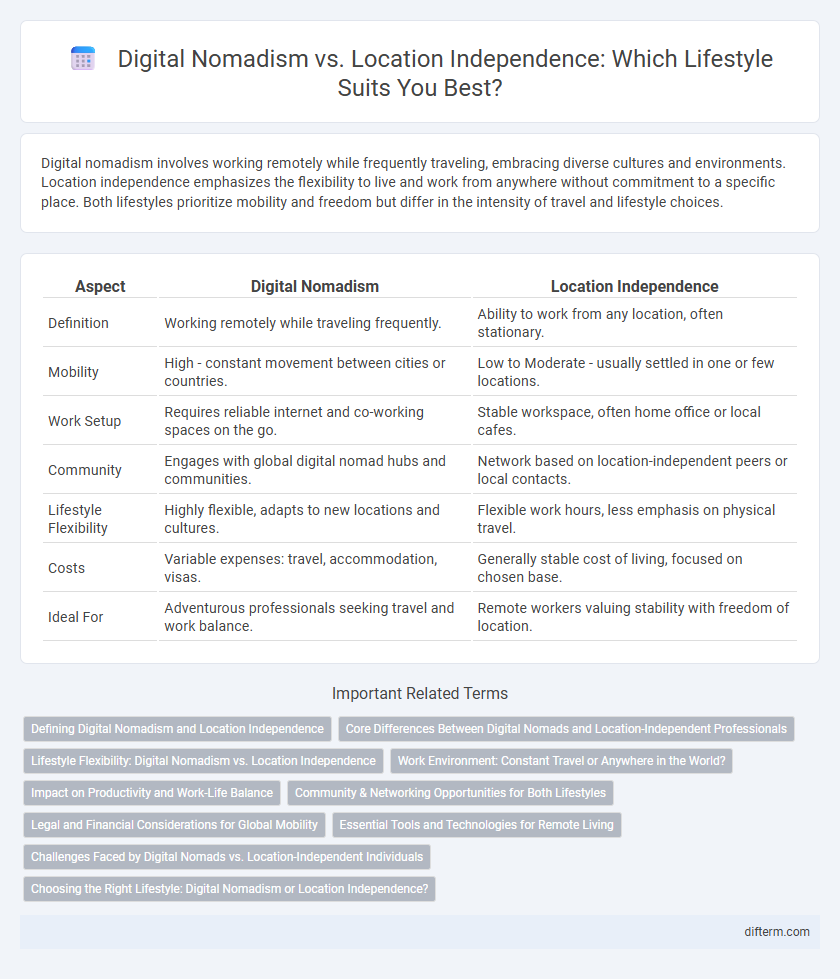Digital nomadism involves working remotely while frequently traveling, embracing diverse cultures and environments. Location independence emphasizes the flexibility to live and work from anywhere without commitment to a specific place. Both lifestyles prioritize mobility and freedom but differ in the intensity of travel and lifestyle choices.
Table of Comparison
| Aspect | Digital Nomadism | Location Independence |
|---|---|---|
| Definition | Working remotely while traveling frequently. | Ability to work from any location, often stationary. |
| Mobility | High - constant movement between cities or countries. | Low to Moderate - usually settled in one or few locations. |
| Work Setup | Requires reliable internet and co-working spaces on the go. | Stable workspace, often home office or local cafes. |
| Community | Engages with global digital nomad hubs and communities. | Network based on location-independent peers or local contacts. |
| Lifestyle Flexibility | Highly flexible, adapts to new locations and cultures. | Flexible work hours, less emphasis on physical travel. |
| Costs | Variable expenses: travel, accommodation, visas. | Generally stable cost of living, focused on chosen base. |
| Ideal For | Adventurous professionals seeking travel and work balance. | Remote workers valuing stability with freedom of location. |
Defining Digital Nomadism and Location Independence
Digital nomadism involves working remotely while traveling frequently, leveraging technology to maintain a mobile lifestyle with no fixed office. Location independence emphasizes the freedom to work from anywhere without geographical constraints, often prioritizing flexibility over constant movement. Both concepts rely heavily on internet connectivity and digital tools to sustain professional productivity outside traditional workspaces.
Core Differences Between Digital Nomads and Location-Independent Professionals
Digital nomads actively travel and work from various locations, often embracing a transient lifestyle enabled by remote technology, while location-independent professionals prioritize flexibility in work environment without the necessity of constant relocation. Digital nomadism emphasizes mobility and exploration, combining work with travel experiences, whereas location independence centers on the freedom to choose where to work, whether staying rooted or occasionally changing locations. Core distinctions lie in the balance between travel frequency, lifestyle goals, and work setup preferences, with digital nomads adopting a more dynamic approach compared to the stable flexibility of location-independent professionals.
Lifestyle Flexibility: Digital Nomadism vs. Location Independence
Lifestyle flexibility in digital nomadism revolves around continuous travel while working remotely, enabling immersion in diverse cultures and environments. Location independence offers a broader scope of choosing any workspace globally without the necessity of constant relocation, supporting stable routines alongside freedom. Both lifestyles prioritize autonomy but differ in the balance between movement and permanence, shaping individual preferences for work-life integration.
Work Environment: Constant Travel or Anywhere in the World?
Digital nomads thrive on constant travel, often working from varied locations like cafes, co-working spaces, and remote destinations to blend exploration with productivity. Location-independent professionals prioritize flexibility, choosing stable work environments anywhere in the world, from home offices to short-term rentals, ensuring consistency in routine and resources. Both lifestyles leverage technology, but the work environment for digital nomads is dynamic and ever-changing, whereas location independence emphasizes adaptability without the necessity of frequent relocation.
Impact on Productivity and Work-Life Balance
Digital nomadism allows professionals to work while traveling, offering diverse environments that can boost creativity but sometimes disrupt routine, potentially affecting productivity. Location independence provides stability by enabling work from chosen, consistent settings, fostering better time management and more structured work-life balance. Both lifestyles enhance flexibility, yet balancing constant movement with focused work remains a key challenge impacting overall efficiency and well-being.
Community & Networking Opportunities for Both Lifestyles
Digital nomads thrive in global coworking hubs, leveraging diverse communities for networking and collaboration, while location-independent professionals often build deeper, localized networks through consistent presence. Both lifestyles emphasize connection, but digital nomadism favors fluid, international engagement, whereas location independence fosters long-term community integration and professional relationships. Access to digital platforms and hybrid events enhances community building for both, supporting continuous growth and resource sharing.
Legal and Financial Considerations for Global Mobility
Understanding visa requirements and tax obligations is crucial for digital nomads and location-independent professionals to ensure compliance with international laws. Navigating diverse legal frameworks and managing multi-jurisdictional taxation demands proactive planning and consultation with legal and financial experts. Effective strategies for banking, health insurance, and retirement contributions support sustainable global mobility while minimizing legal and financial risks.
Essential Tools and Technologies for Remote Living
Essential tools for digital nomadism include reliable laptops, portable Wi-Fi hotspots, VPN services, and cloud storage platforms to ensure secure and efficient remote work. Location independence relies heavily on collaboration tools like Slack, Zoom, and project management software such as Asana or Trello to maintain productivity across time zones. Battery packs, noise-canceling headphones, and mobile office setups further enhance flexibility and comfort in diverse environments.
Challenges Faced by Digital Nomads vs. Location-Independent Individuals
Digital nomads often grapple with unstable internet connections, visa restrictions, and frequent relocations that disrupt routine and social ties. Location-independent individuals, while enjoying more flexibility, face challenges in maintaining work-life balance and establishing professional networks outside traditional office environments. Both lifestyles require strong self-discipline and adaptability to overcome geographic and logistical obstacles inherent in remote work.
Choosing the Right Lifestyle: Digital Nomadism or Location Independence?
Choosing the right lifestyle between digital nomadism and location independence depends on personal preferences for mobility and stability. Digital nomadism emphasizes constant travel and working from diverse global locations, ideal for those seeking adventure and cultural immersion. Location independence offers the flexibility to work remotely with a stable home base, appealing to individuals who prioritize routine and deep community connections.
digital nomadism vs location independence Infographic

 difterm.com
difterm.com